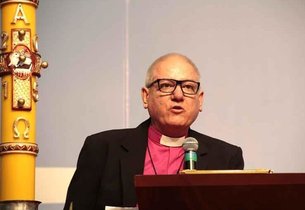The campaign “Care for our Common Home” lifts up the right to clean water and sanitation in Brazil, a significant economy but one with great inequality and severe gaps in basic services and environmental standards.
“CONIC’s [National Council of Christian Churches in Brazil] mission is to strengthen the ‘ecumenism of service and justice’. This international ecumenical Lenten Campaign can help to achieve that, so the struggle to prevent diseases and the spread of the mosquito in this period is essential,” Episcopal Anglican Church of Brazil (IEAB) Bishop Flavio Irala, President of CONIC, has said.
Care for Our Common Home is rooted in the biblical text calling for justice to “roll down like waters” and righteousness “like an ever flowing stream”. (Amos 5:24) CONIC coordinates the campaign, which links churches with faith based organisations and social movements.
The Aedes aegypti mosquito that transmits the Zika virus to humans is able to breed where pools of water are left standing. The virus is spreading rapidly and has now been detected in at least 23 countries across the Americas, leading the World Health Organisation (WHO) to declare a global public health emergency.
Pregnant women are at particular risk due to a suspected link between the Zika virus and microcephaly in babies, a birth defect where a baby’s head is smaller than expected when compared to babies of the same sex and age. According to WHO, if microcephaly is combined with poor brain growth, developmental disabilities may result. Around 4000 babies have been born with microcephaly in Brazil since October 2015.
While the usual symptoms of the Zika virus – mild fever, skin rashes, conjunctivitis, muscle and joint pain and headaches – are not severe, the suspected link to microcephaly in babies is serious and preventative measures are crucial. WHO is advising in particular women who are pregnant or planning to become pregnant to take measures to protect themselves from mosquito bites.
The need for proper sanitation is also critical. According to the WHO, any amount of standing water is a potential mosquito breeding site and needs to be cleaned, emptied, covered, or otherwise treated. This is a particular challenge in urban areas, where poor sanitation leaves pools of water hidden in waste grounds and amongst refuse.
For IEAB, the current Zika crisis is a key moment to promote community action and advocate for a strong governmental response to ensure sustainable and just living conditions.
“Half of the population of Brazil has no access to sanitation and a great number have no clean water. The outbreak of Zika is an example of the neglectful situation in which our people live. All of this can be overcome with education, mobilisation and public policies that take into consideration the preservation of the environment,” noted IEAB Primate Archbishop Francisco de Assis da Silva in lending his support to the Lenten Campaign.
The Anglican Alliance welcomes the IEAB’s engagement in “Care for Our Common Home”.
“Access to health care and proper sanitation, such as safe water, sewage treatment and garbage collection, are targets of the new Sustainable Development Goals and fundamental elements for communities to live in health and dignity,” said Anglican Alliance Co-Executive Director the Revd Rachel Carnegie.
The Anglican Alliance will continue to monitor the situation of the Zika public health emergency, highlight advice from the WHO and share examples of responses within the Anglican Communion.
“With its presence in every community, the churches have a key role to play in raising awareness on prevention of the Zika virus, as well as advocating with governments on water and sanitation issues,” she said.
On behalf of the churches in Brazil, Rachel asked members of the Communion to remember in prayer families who have been affected by this public health emergency or are living in anxiety. “Pray that they will receive care and support at this time.”
––––––––––––––––––––––––
Zika virus preventative measures
- Use insect repellent
- Wear clothes (preferably light coloured) that cover as much of the body as possible
- Cover openings in buildings with screens, and close doors and windows
- Sleep under mosquito nets, especially during the day, when mosquitoes are most active
- Empty, clean or cover containers that can hold water, such as buckets, flower pots and tyres
In particular women who are pregnant or planning to become pregnant who should take extra care to protect themselves from the bites of the mosquito that transmits Zika.
Source: WHO
––––––––––––––––––––––––
Photo: The Rt Revd Flavio Irala, Bishop of São Paulo and President of CONIC, speaks at a Lenten campaign preparatory meeting. Credit: CONIC
––––––––––––––––––––––––
Related Resources
Read the 2016 Lenten Message from the IEAB Primate in English and Portuguese
Watch the “Care for Our Common Home” campaign video (Portuguese)

